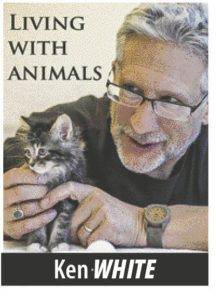I prefer terms like big boned, Rubenesque, or zaftig, but a recent New York Times article was far more direct: “Humans are not the only residents of the United States who are getting fatter every year. So, unsurprisingly, are our furry friends – the dogs and cats that share our lives and, too often, our tendency to overeat. Unlike their owners, however, the family dog or cat cannot open the refrigerator or gain access to snacks in high cupboards without human assistance, which means the responsibility for pet obesity rests with you-know-who.” Addressing my fellow you-know-whos, we have a real problem here! Sure, fat cats playing the piano makes for entertaining on-line viewing but veterinarians report roughly half the animals in their practice are between overweight and obese, while denial being another defining human characteristic (like the belief that food equals love) less than twenty percent of owners admit to fat pets.
According to pet health insurers who have an obvious financial stake in this, the growing epidemic of pet obesity increases annually, along with related claims for illness and injuries. To put a number to that, obesity-related pet health insurance claims topped $69 million in 2017 alone, a 24 percent increase over the last eight years. Bad enough, but when we factor in that only 2 percent of pets are covered by pet health insurance one can easily imagine a total in the billions. Dollars of course are not the only cost. Quality of life and longevity are the real although less tangible ways to measure the impacts. Common pet obesity ailments include arthritis, heart disease, bladder and urinary tract illness, kidney and liver disease, diabetes, high blood pressure and spinal injury. One study of Labradors, a breed prone to porking up, showed that obesity can easily take two years off a lifespan.
The answers are the same regardless of species, human or otherwise. Except for those relatively rare instances where weight-gain is related to some underlying illness, prevention is best but if the fat ship has already set sail then reduce calories and increase activity. Less treats, walking, play. Just as with people, a slow and steady approach is less miserable and better likely to produce long-lasting results.

